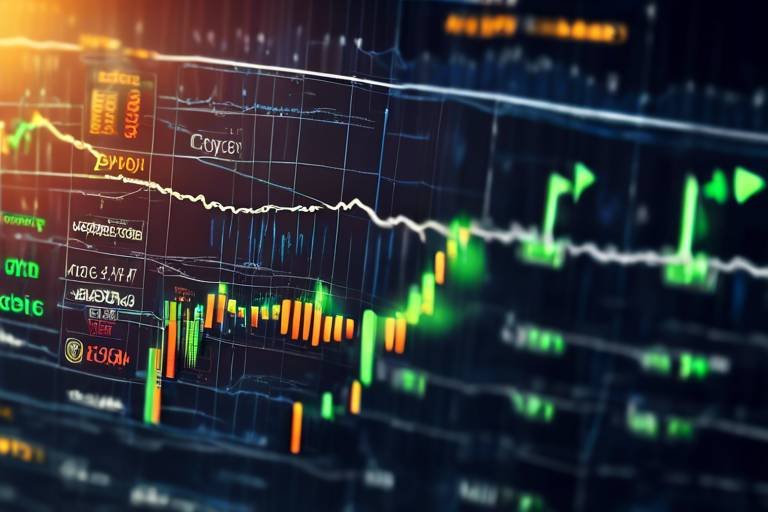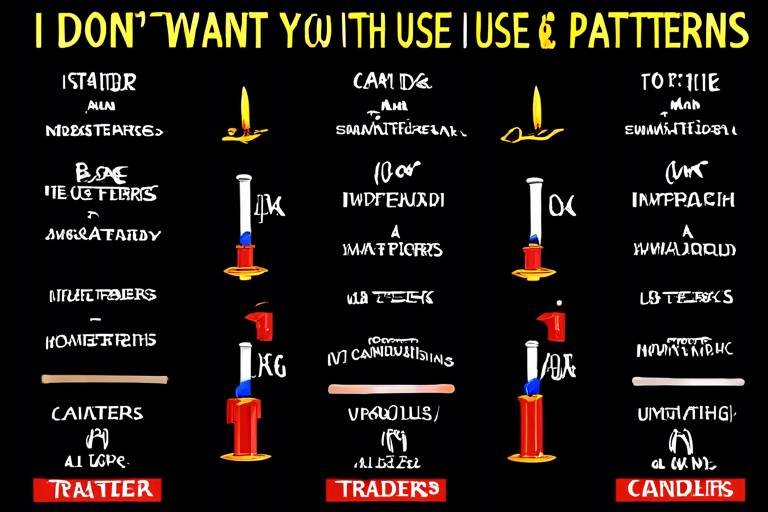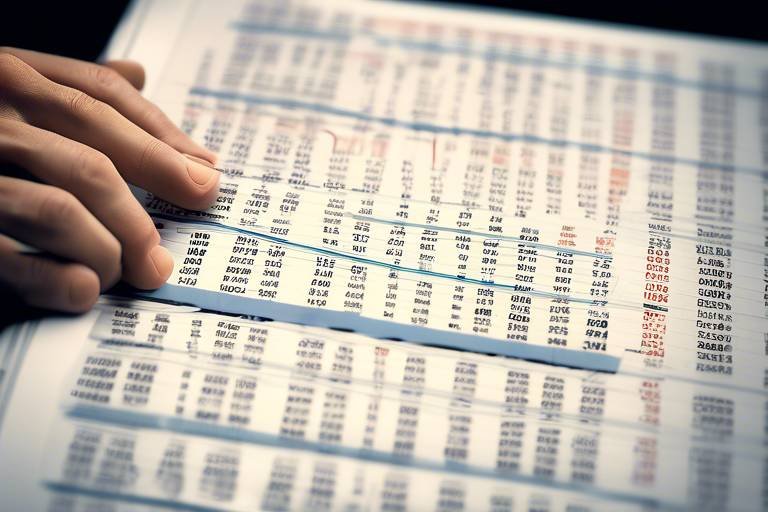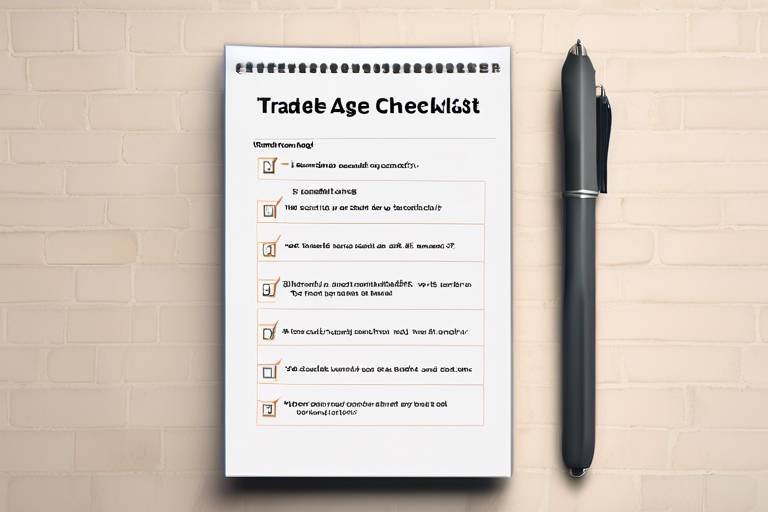Understanding the Risk of Overtrading
Overtrading is a term that sounds simple, yet it carries a heavy weight in the world of trading and finance. Imagine a race car driver who accelerates without regard for the road ahead—this is akin to what happens when traders engage in excessive buying and selling of assets. The thrill of the trade can be intoxicating, but just like that driver, they may end up crashing if they’re not careful. Overtrading occurs when traders, driven by emotions or market volatility, make impulsive decisions that can lead to significant financial losses.
To truly grasp the implications of overtrading, one must understand that it is not merely a matter of making too many trades. It’s about the quality of those trades and the mental state of the trader. When traders operate without a clear plan or succumb to emotional impulses, they often find themselves in a downward spiral of poor decision-making. This article delves into the causes and effects of overtrading, as well as strategies to mitigate its risks, ensuring that traders can navigate the markets more effectively.
At its core, overtrading is characterized by an excessive frequency of trades, typically driven by emotional responses rather than strategic planning. Traders may find themselves buying and selling assets more often than necessary, which leads to increased transaction costs and a higher likelihood of making rash decisions. Understanding the definition of overtrading is crucial because it lays the foundation for developing effective trading strategies that prioritize long-term success over short-term gains.
The causes of overtrading are as varied as the traders themselves. Emotional factors play a significant role, with fear, greed, and excitement often steering traders off course. Additionally, a lack of discipline and a well-structured trading plan can leave traders vulnerable to the pitfalls of overtrading. By identifying these causes, traders can work towards developing healthier trading habits that mitigate the risk of overtrading.
Emotional trading is a major contributor to overtrading. When traders allow their emotions to dictate their actions, they may make impulsive decisions that deviate from their trading strategies. Recognizing these emotions is essential for maintaining a rational approach to trading. For instance, the fear of missing out (FOMO) can push traders to enter positions hastily, fearing they will miss lucrative opportunities. Understanding FOMO can help traders resist impulsive actions and make more calculated decisions.
FOMO is a powerful psychological driver that can lead to hasty trading decisions. It’s that nagging feeling that if you don’t act now, you’ll miss out on a golden opportunity. This fear can cloud judgment and lead to regrettable trades. By acknowledging FOMO and developing strategies to counteract it, traders can maintain a level head and make more informed decisions.
On the flip side, greed and overconfidence can also lead traders astray. When traders believe they have a winning strategy, they may take unnecessary risks, convinced that they can’t lose. This mindset can create a dangerous cycle where traders ignore their trading plans and act impulsively. Developing self-awareness is vital for managing these emotions effectively and ensuring that trading remains a disciplined endeavor.
A well-structured trading plan is essential for success. Without one, traders may succumb to overtrading, leading to inconsistent results and increased risk exposure. A trading plan serves as a roadmap, guiding traders through the complexities of the market and helping them stay focused on their goals. By setting clear parameters for entry and exit points, traders can minimize emotional decision-making and maintain a disciplined approach.
The consequences of overtrading can be severe, impacting a trader's financial health, emotional well-being, and overall performance. Understanding these effects is vital for long-term success in trading. Excessive trading can lead to significant financial losses, emotional burnout, and a decline in trading performance. By recognizing these risks, traders can take proactive measures to safeguard their investments and mental health.
Excessive trading often leads to substantial financial losses due to high transaction costs and poor decision-making. Each trade incurs fees, and when traders make too many trades, these costs can accumulate quickly. Recognizing this risk is crucial for maintaining profitability in the long run. The key takeaway? Less can often be more when it comes to trading.
The stress of overtrading can lead to emotional burnout, affecting a trader's mental health and decision-making abilities. Trading should be a strategic endeavor, not a source of constant anxiety. Prioritizing self-care and balance is essential for sustainable trading practices. Taking breaks, practicing mindfulness, and engaging in activities outside of trading can help mitigate the risk of burnout and keep traders mentally sharp.
Implementing effective strategies can help traders avoid overtrading and improve their overall performance. These strategies focus on discipline, planning, and emotional management. Setting clear goals and utilizing risk management techniques are two essential components of a successful trading strategy.
Establishing clear and achievable trading goals can help maintain focus and prevent excessive trading. Goal-setting encourages disciplined decision-making and accountability. By defining what success looks like, traders can better align their actions with their objectives, reducing the temptation to overtrade.
Employing risk management techniques, such as stop-loss orders and position sizing, can help mitigate the risks associated with overtrading. These practices promote safer trading environments, allowing traders to protect their capital while still pursuing profitable opportunities.
- What is overtrading? Overtrading is the excessive buying and selling of assets, often driven by emotional factors.
- What causes overtrading? Causes include emotional trading, lack of discipline, and absence of a trading plan.
- What are the effects of overtrading? Effects can include financial losses, emotional burnout, and decreased trading performance.
- How can I avoid overtrading? Setting clear goals and utilizing risk management techniques are effective strategies to prevent overtrading.

What is Overtrading?
Overtrading is a term that describes the excessive buying and selling of financial assets within a short period. Imagine a kid in a candy store, overwhelmed by choices, grabbing everything in sight without considering the consequences. That’s what overtrading can feel like for a trader. It often leads to poor decision-making and significant financial losses, as traders act impulsively rather than strategically. Understanding the definition of overtrading is crucial for anyone looking to navigate the turbulent waters of financial markets effectively.
In essence, overtrading stems from a lack of discipline and a failure to stick to a well-defined trading plan. When traders engage in this behavior, they often find themselves chasing fleeting opportunities, leading to a cycle of emotional highs and lows. The thrill of a successful trade can quickly turn into despair when the next trade goes awry, creating a rollercoaster of emotions that can cloud judgment.
To better understand overtrading, it’s important to recognize that it can manifest in various forms. For instance, some traders might enter multiple trades simultaneously, while others may frequently modify their positions based on market fluctuations. Here are a few key indicators of overtrading:
- High Frequency of Trades: Multiple trades executed in a short timeframe.
- Increased Transaction Costs: Higher fees due to frequent buying and selling.
- Emotional Reactions: Trading based on fear or excitement rather than analysis.
The consequences of overtrading can be severe. Not only does it lead to financial losses, but it can also take a toll on a trader's mental well-being. The constant pressure to perform can lead to stress and anxiety, making it even more challenging to make rational decisions. Therefore, understanding what overtrading is and recognizing its signs is the first step towards fostering a healthier and more productive trading approach.
Q: What are the main causes of overtrading?
A: Overtrading is often caused by emotional trading, lack of a structured trading plan, and the influence of market volatility. Recognizing these factors can help traders develop better habits.
Q: How can I identify if I am overtrading?
A: If you notice a high frequency of trades, increased transaction costs, and emotional reactions influencing your decisions, you may be overtrading.
Q: What strategies can help prevent overtrading?
A: Setting clear trading goals, employing risk management techniques, and maintaining a disciplined approach can significantly reduce the risk of overtrading.

Causes of Overtrading
Overtrading is a complex phenomenon that stems from various psychological and situational factors. Understanding these causes is crucial for traders who want to develop a disciplined approach to their trading strategies. One of the primary drivers of overtrading is emotional trading. When traders allow their emotions—such as fear, greed, or excitement—to dictate their actions, they often make impulsive decisions that can lead to excessive buying and selling.
For instance, the Fear of Missing Out (FOMO) is a powerful emotion that can push traders to jump into trades without proper analysis. Imagine standing at the edge of a party, hearing laughter and music, and feeling an overwhelming urge to join in without considering if it’s really your scene. Similarly, traders may rush into positions fearing they will miss lucrative opportunities, which can result in hasty decisions that lack strategic thought.
Moreover, greed and overconfidence can also cloud a trader's judgment. When traders experience a string of successful trades, they might feel invincible, leading them to take unnecessary risks. This overconfidence can result in a false sense of security, causing them to overlook critical factors that should influence their trading decisions. Developing a sense of self-awareness is vital in managing these emotions effectively. Here’s a simple table to illustrate how these emotions can impact trading behavior:
| Emotion | Impact on Trading |
|---|---|
| Fear | Leads to impulsive selling or missed opportunities. |
| Greed | Encourages taking on excessive risk for higher rewards. |
| Overconfidence | Results in neglecting risk management strategies. |
Another significant cause of overtrading is the lack of a trading plan. A well-structured trading plan serves as a roadmap for traders, guiding their decisions and helping them stay focused on their goals. Without a clear plan, traders may find themselves drifting from one trade to another, leading to inconsistent results and increased exposure to risk. Think of it like embarking on a road trip without a map—you're likely to get lost and waste time making unnecessary stops.
In addition, market volatility can also trigger overtrading. When the markets are unpredictable, traders might feel compelled to react quickly to changes, which can lead to a flurry of trades that aren’t well thought out. This reactionary behavior often results in trading decisions that are more emotional than strategic. To combat this, traders should focus on developing a robust trading strategy that considers market conditions while also recognizing the importance of emotional regulation.
By identifying these underlying causes of overtrading, traders can take proactive steps to mitigate their impact. This awareness allows for the development of better habits and strategies that not only enhance trading performance but also contribute to a healthier emotional state. Ultimately, understanding the causes of overtrading is the first step towards achieving long-term success in the financial markets.

Emotional Trading
Emotional trading is a phenomenon that can significantly impact a trader's decision-making process. It arises when traders allow their feelings to dictate their actions, often leading to impulsive decisions that deviate from their original trading strategy. Imagine being on a rollercoaster ride where every twist and turn is dictated by your emotions—this is how trading can feel when emotions take the wheel. Common emotions that fuel this behavior include fear, greed, and excitement. Recognizing these emotions is crucial for maintaining a rational approach to trading.
When traders experience fear of missing out (FOMO), they may rush to enter positions without conducting proper analysis. This fear is akin to being at a party and seeing everyone dancing; you feel compelled to join in, even if you’re not ready. FOMO can lead to hasty decisions, resulting in entering trades that are not well thought out. To combat FOMO, traders must remind themselves that opportunities will arise again, and that patience is often rewarded in the markets.
On the flip side, greed and overconfidence can also cloud judgment. When traders experience a string of successful trades, they might feel invincible, leading them to take on excessive risks. This is like a gambler who keeps betting because they believe luck is on their side, only to face a sudden loss that wipes out their gains. Developing self-awareness is vital in managing these emotions effectively. Traders should regularly assess their emotional state and recognize when they are being driven by irrational feelings rather than logical analysis.
To help manage emotional trading, it is beneficial to incorporate practices that promote emotional discipline. Here are some strategies that can help:
- Regular Reflection: Take time to reflect on past trades and analyze the emotional factors that influenced your decisions.
- Mindfulness Techniques: Engage in mindfulness practices such as meditation or deep breathing to stay grounded and focused.
- Journaling: Keep a trading journal where you document not only your trades but also your emotional state during those trades.
By employing these strategies, traders can create a more balanced approach to their trading activities. Remember, emotional trading is a natural part of the trading experience, but it doesn’t have to dictate your success. With awareness and practice, you can learn to navigate the emotional landscape of trading more effectively.
Q: What is emotional trading?
A: Emotional trading occurs when traders allow their feelings, such as fear or greed, to influence their trading decisions instead of relying on logical analysis.
Q: How can I manage my emotions while trading?
A: You can manage your emotions by practicing mindfulness, keeping a trading journal, and regularly reflecting on your past trades to identify emotional influences.
Q: What are the consequences of emotional trading?
A: Emotional trading can lead to poor decision-making, significant financial losses, and increased stress levels, ultimately affecting a trader's overall performance.

Fear of Missing Out (FOMO)
The Fear of Missing Out, commonly known as FOMO, is a powerful psychological phenomenon that can significantly impact a trader's decision-making process. Imagine standing at the edge of a party, where everyone is having a great time, and you feel the urge to jump in, even if you’re not quite ready. This feeling is akin to what traders experience when they see others profiting from market movements. The fear that they might miss a lucrative opportunity can lead to rushed decisions, often resulting in poor trades.
When FOMO kicks in, traders may find themselves entering positions without proper analysis or research, driven purely by the desire to not be left behind. This impulsive behavior can lead to a cycle of overtrading, where the trader is constantly reacting to market fluctuations rather than following a well-thought-out plan. The emotional high of making a trade can be intoxicating, but it often clouds judgment and leads to regrettable financial choices.
To combat FOMO, it's essential to develop a solid trading strategy that includes clear entry and exit points. Here are some strategies that may help mitigate the effects of FOMO:
- Set a Trading Plan: Create a robust trading plan that outlines your goals, strategies, and risk management techniques. This plan should serve as your roadmap, helping you stay focused and disciplined.
- Practice Mindfulness: Incorporating mindfulness techniques can help you become more aware of your emotions and reactions to market changes, allowing you to make more rational decisions.
- Limit Information Overload: While staying informed is crucial, too much information can lead to confusion and anxiety. Choose a few reliable sources for market news and stick to them.
Ultimately, understanding and acknowledging the presence of FOMO is the first step in overcoming it. By recognizing that the market is always going to present new opportunities, traders can learn to wait for the right moment rather than acting out of fear. This shift in mindset can lead to more calculated trades and, ultimately, better financial outcomes.
- What is FOMO in trading? FOMO in trading refers to the anxiety or fear that traders experience when they believe they might miss out on a profitable opportunity, leading them to make impulsive trades.
- How can I manage FOMO? Managing FOMO involves setting a clear trading plan, practicing mindfulness, and limiting the amount of information you consume to avoid feeling overwhelmed.
- Is FOMO a common issue among traders? Yes, FOMO is a prevalent issue among traders, especially those who are new to the market or who lack a structured trading strategy.

Greed and Overconfidence
Greed and overconfidence are two powerful emotions that can significantly impact a trader's decision-making process. When traders become overly confident in their abilities, they may start to believe that they can predict market movements with absolute certainty. This can lead to taking on excessive risks, often without proper analysis or consideration of potential consequences. Imagine a gambler who wins a few rounds at the casino; their initial success can create a false sense of invincibility, prompting them to wager more than they can afford to lose. In the same vein, traders may increase their positions, convinced that their luck will continue.
Greed often manifests as a desire for quick profits, pushing traders to enter and exit trades impulsively. This behavior can cloud judgment and lead to decisions based on emotion rather than sound strategy. For instance, a trader who sees a stock rapidly increasing in value might rush to buy, fearing they will miss out on potential gains. However, this rush can result in buying at inflated prices, ultimately leading to losses when the asset corrects.
To combat these detrimental effects, it's essential for traders to cultivate self-awareness. Recognizing when greed and overconfidence are influencing their decisions can help them take a step back and reassess their strategies. Here are a few tips to maintain a balanced approach:
- Keep a Trading Journal: Documenting trades can help identify patterns of behavior driven by greed or overconfidence.
- Set Realistic Expectations: Understand that not every trade will be profitable, and losses are part of the journey.
- Seek Feedback: Engaging with fellow traders or mentors can provide valuable perspectives and help mitigate the influence of emotions.
In summary, while a certain level of confidence is necessary for successful trading, it’s crucial to strike a balance. Traders should focus on developing a disciplined approach that prioritizes analysis and strategy over emotional impulses. By doing so, they can navigate the markets more effectively and reduce the risks associated with greed and overconfidence.
- What is overtrading? Overtrading occurs when traders excessively buy and sell assets, often leading to poor decision-making and financial losses.
- How can I avoid overtrading? Establish clear trading goals, maintain a structured trading plan, and practice emotional management techniques.
- What are the consequences of overtrading? It can lead to significant financial losses, emotional burnout, and impaired decision-making abilities.
- How does greed affect trading? Greed can prompt traders to take unnecessary risks, resulting in impulsive decisions that may lead to losses.
- Why is self-awareness important in trading? Self-awareness helps traders recognize emotional influences on their decisions, allowing for more rational trading strategies.

Lack of a Trading Plan
Having a well-structured trading plan is akin to a sailor navigating through stormy seas. Without a clear roadmap, traders can easily find themselves adrift, making impulsive decisions that could lead to disastrous outcomes. A trading plan serves as a blueprint, outlining specific strategies, risk management techniques, and goals that guide traders through the often unpredictable waters of financial markets. When traders operate without a plan, they may succumb to emotional impulses, leading to overtrading and inconsistent results.
Imagine setting off on a road trip without a map or GPS. You might start off with great enthusiasm, but soon enough, you could find yourself lost, wandering aimlessly. Similarly, traders without a defined plan often chase after fleeting market trends, buying and selling assets on a whim, which can result in significant financial losses. The absence of a trading plan not only affects the trader's financial health but can also lead to a sense of confusion and frustration, further exacerbating the problem.
To illustrate the importance of a trading plan, consider the following key components that should be included:
- Market Analysis: Understanding the market conditions and trends is crucial. A solid trading plan should include a strategy for analyzing the market, whether through technical analysis, fundamental analysis, or a combination of both.
- Entry and Exit Strategies: Clearly defined entry and exit points help traders make informed decisions. This includes setting specific criteria for when to enter a trade and when to close it.
- Risk Management: A good trading plan incorporates risk management techniques, such as setting stop-loss orders and determining position sizes to protect against significant losses.
- Performance Evaluation: Regularly reviewing and assessing trading performance can help identify what works and what doesn’t, allowing for adjustments to the plan as needed.
In conclusion, a lack of a trading plan is a recipe for disaster in the world of trading. By establishing a clear and comprehensive plan, traders can navigate the markets with confidence, making informed decisions that align with their financial goals. It's essential to remember that trading is not just about making quick profits; it's about developing a sustainable approach that minimizes risks and maximizes potential rewards.
- What is the main purpose of a trading plan? A trading plan serves as a roadmap for traders, helping them to make informed decisions, manage risks, and maintain discipline in their trading activities.
- How often should I review my trading plan? It's advisable to review your trading plan regularly, especially after significant market changes or personal trading experiences, to ensure it remains relevant and effective.
- Can I trade without a plan? While it's possible to trade without a plan, it significantly increases the risk of poor decision-making and financial losses. A plan provides structure and discipline.
- What should I do if my trading plan isn't working? If your trading plan isn’t yielding the expected results, it may be time to reevaluate your strategies, market analysis methods, and risk management techniques.

Effects of Overtrading
This article explores the concept of overtrading, its causes, effects on traders, and strategies to mitigate risks associated with excessive trading behavior in financial markets.
Overtrading occurs when traders engage in excessive buying and selling of assets, often leading to poor decision-making and financial losses. Understanding its definition is crucial for effective trading strategies.
Several factors contribute to overtrading, including emotional decisions, lack of discipline, and market volatility. Identifying these causes can help traders develop better habits and strategies to avoid pitfalls.
Emotional trading arises from fear, greed, or excitement, often leading to impulsive decisions. Recognizing these emotions is essential for maintaining a rational approach to trading.
FOMO drives traders to enter positions hastily, fearing they will miss lucrative opportunities. Understanding FOMO can help traders resist impulsive actions and make more calculated decisions.
Greed and overconfidence can cloud judgment, prompting traders to take unnecessary risks. Developing self-awareness is vital for managing these emotions effectively.
A well-structured trading plan is essential for success. Without one, traders may succumb to overtrading, leading to inconsistent results and increased risk exposure.
Overtrading can have detrimental effects on a trader's financial health, emotional well-being, and overall performance. Understanding these consequences is vital for long-term success in trading. The repercussions of overtrading can be profound, often manifesting in both tangible and intangible ways.
One of the most immediate effects of overtrading is financial losses. Excessive trading often leads to significant financial losses due to high transaction costs and poor decision-making. For instance, each trade incurs fees, and when traders engage in frequent buying and selling, these costs can accumulate quickly, eroding profits. Recognizing this risk is crucial for maintaining profitability.
Furthermore, overtrading can lead to emotional burnout. The stress of constantly monitoring the markets and making impulsive trades can take a toll on a trader's mental health. This emotional strain can impair decision-making abilities, leading to a vicious cycle where poor choices result in further losses, compounding the stress. Prioritizing self-care and balance is essential for sustainable trading practices.
To illustrate the financial impact of overtrading, consider the following table:
| Aspect | Impact of Overtrading |
|---|---|
| Transaction Costs | Increased fees from frequent trades |
| Profitability | Potentially reduced due to poor decision-making |
| Emotional Stress | Higher levels of anxiety and burnout |
| Decision Quality | Decreased effectiveness in trading decisions |
In summary, the effects of overtrading can be far-reaching, affecting not only financial outcomes but also emotional stability. Traders must recognize these potential pitfalls and take proactive steps to mitigate the risks associated with excessive trading behavior.
Implementing effective strategies can help traders avoid overtrading and improve their overall performance. These strategies focus on discipline, planning, and emotional management.
Establishing clear and achievable trading goals can help maintain focus and prevent excessive trading. Goal-setting encourages disciplined decision-making and accountability.
Employing risk management techniques, such as stop-loss orders and position sizing, can help mitigate the risks associated with overtrading. These practices promote safer trading environments.
- What is the most common cause of overtrading? Emotional trading, particularly driven by fear and greed, is often the most common cause of overtrading.
- How can I recognize if I am overtrading? Signs include feeling anxious about trades, frequently checking market prices, and experiencing financial losses due to high transaction costs.
- What are some effective strategies to prevent overtrading? Setting clear trading goals, creating a structured trading plan, and employing risk management techniques are effective strategies to prevent overtrading.

Financial Losses
This article explores the concept of overtrading, its causes, effects on traders, and strategies to mitigate risks associated with excessive trading behavior in financial markets.
Overtrading occurs when traders engage in excessive buying and selling of assets, often leading to poor decision-making and financial losses. Understanding its definition is crucial for effective trading strategies.
Several factors contribute to overtrading, including emotional decisions, lack of discipline, and market volatility. Identifying these causes can help traders develop better habits and strategies to avoid pitfalls.
Emotional trading arises from fear, greed, or excitement, often leading to impulsive decisions. Recognizing these emotions is essential for maintaining a rational approach to trading.
FOMO drives traders to enter positions hastily, fearing they will miss lucrative opportunities. Understanding FOMO can help traders resist impulsive actions and make more calculated decisions.
Greed and overconfidence can cloud judgment, prompting traders to take unnecessary risks. Developing self-awareness is vital for managing these emotions effectively.
A well-structured trading plan is essential for success. Without one, traders may succumb to overtrading, leading to inconsistent results and increased risk exposure.
Overtrading can have detrimental effects on a trader's financial health, emotional well-being, and overall performance. Understanding these consequences is vital for long-term success in trading.
Excessive trading often leads to significant financial losses due to high transaction costs and poor decision-making. When a trader engages in frequent buying and selling, they incur numerous commissions and fees that can quickly accumulate. For instance, a trader who makes 20 trades in a month might face costs that significantly eat into their profits. Here’s a quick breakdown:
| Type of Cost | Example Cost per Trade | Total Cost for 20 Trades |
|---|---|---|
| Commission Fees | $10 | $200 |
| Spread Costs | $5 | $100 |
| Total Costs | $300 |
As illustrated, the total costs can amount to a staggering $300 just for executing trades, which could have been avoided with a more disciplined approach. Additionally, the stress and pressure associated with constant trading can lead to poor decision-making, resulting in further losses. When traders act on impulse rather than strategy, they often overlook critical analysis and risk management, which can compound their financial woes.
Moreover, the psychological toll of experiencing continuous losses can create a vicious cycle that drives traders to overtrade even more in an attempt to recover their losses, leading to a downward spiral. Recognizing this risk is crucial for maintaining profitability and ensuring that trading remains a strategic endeavor rather than a reckless gamble. To mitigate these risks, traders must adopt a disciplined approach, focusing on long-term gains rather than short-term thrills.
Implementing effective strategies can help traders avoid overtrading and improve their overall performance. These strategies focus on discipline, planning, and emotional management.
Establishing clear and achievable trading goals can help maintain focus and prevent excessive trading. Goal-setting encourages disciplined decision-making and accountability.
Employing risk management techniques, such as stop-loss orders and position sizing, can help mitigate the risks associated with overtrading. These practices promote safer trading environments.
- What is overtrading? Overtrading refers to excessive buying and selling of assets, often leading to poor decision-making and financial losses.
- What causes overtrading? Causes include emotional decisions, lack of discipline, and market volatility.
- How can I avoid overtrading? Implementing a solid trading plan, setting clear goals, and employing risk management techniques can help.
- What are the effects of overtrading? Overtrading can lead to financial losses, emotional burnout, and impaired decision-making.

Emotional Burnout
This article explores the concept of overtrading, its causes, effects on traders, and strategies to mitigate risks associated with excessive trading behavior in financial markets.
Overtrading occurs when traders engage in excessive buying and selling of assets, often leading to poor decision-making and financial losses. Understanding its definition is crucial for effective trading strategies.
Several factors contribute to overtrading, including emotional decisions, lack of discipline, and market volatility. Identifying these causes can help traders develop better habits and strategies to avoid pitfalls.
Emotional trading arises from fear, greed, or excitement, often leading to impulsive decisions. Recognizing these emotions is essential for maintaining a rational approach to trading.
FOMO drives traders to enter positions hastily, fearing they will miss lucrative opportunities. Understanding FOMO can help traders resist impulsive actions and make more calculated decisions.
Greed and overconfidence can cloud judgment, prompting traders to take unnecessary risks. Developing self-awareness is vital for managing these emotions effectively.
A well-structured trading plan is essential for success. Without one, traders may succumb to overtrading, leading to inconsistent results and increased risk exposure.
Overtrading can have detrimental effects on a trader's financial health, emotional well-being, and overall performance. Understanding these consequences is vital for long-term success in trading.
Excessive trading often leads to significant financial losses due to high transaction costs and poor decision-making. Recognizing this risk is crucial for maintaining profitability.
The stress of overtrading can lead to , which significantly affects a trader's mental health and decision-making abilities. When traders find themselves caught in a cycle of constant trading, they may experience feelings of fatigue, frustration, and even despair. The relentless pressure to make profitable trades can create a toxic environment that drains their emotional energy.
To illustrate the impact of emotional burnout, consider the following:
| Symptoms of Emotional Burnout | Potential Consequences |
|---|---|
| Increased irritability | Poor decision-making |
| Loss of motivation | Inconsistent trading results |
| Heightened anxiety | Emotional distress |
| Difficulty concentrating | Missed trading opportunities |
As you can see, the effects of emotional burnout can ripple through a trader's performance, leading to a vicious cycle of further losses and heightened stress. It's crucial for traders to prioritize self-care and maintain a healthy work-life balance. This might mean taking regular breaks, engaging in physical activity, or even setting aside time for hobbies and relaxation. By doing so, traders can recharge their mental batteries and approach the market with renewed focus and clarity.
Implementing effective strategies can help traders avoid overtrading and improve their overall performance. These strategies focus on discipline, planning, and emotional management.
Establishing clear and achievable trading goals can help maintain focus and prevent excessive trading. Goal-setting encourages disciplined decision-making and accountability.
Employing risk management techniques, such as stop-loss orders and position sizing, can help mitigate the risks associated with overtrading. These practices promote safer trading environments.
- What is the main cause of overtrading? Emotional factors such as fear and greed, along with a lack of a structured trading plan, are leading causes of overtrading.
- How can I recognize if I am overtrading? Signs include frequent trading without a clear strategy, feeling stressed or anxious about trades, and experiencing significant financial losses.
- What are effective strategies to prevent overtrading? Setting clear trading goals, sticking to a well-defined trading plan, and utilizing risk management techniques can help prevent overtrading.

Strategies to Avoid Overtrading
When it comes to trading, avoiding the pitfall of overtrading is crucial for maintaining both your financial health and emotional stability. One of the most effective strategies to combat this issue is to set clear goals. By establishing specific, measurable, and achievable trading objectives, you create a roadmap that guides your decisions. Think of your trading goals as a compass; they help you stay on course and prevent you from wandering into impulsive trades that can lead to losses. For instance, if your goal is to achieve a certain percentage return on investment within a set timeframe, you are less likely to make hasty decisions based on market fluctuations.
Another essential strategy is to utilize risk management techniques. This involves employing tools like stop-loss orders and position sizing to protect your capital. A stop-loss order automatically sells your asset when it reaches a predetermined price, limiting your potential losses. This is akin to having a safety net; it allows you to trade with confidence, knowing that you have measures in place to minimize financial damage. Position sizing, on the other hand, helps you determine the appropriate amount of capital to risk on each trade. By carefully calculating your position size based on your overall portfolio and risk tolerance, you can avoid the temptation to overtrade in hopes of quick gains.
Moreover, maintaining a trading journal can significantly enhance your trading discipline. Documenting your trades, including the reasoning behind each decision, helps you reflect on your performance and identify patterns in your behavior. Over time, you may notice tendencies that lead to overtrading, such as trading too frequently during volatile market conditions. By being aware of these triggers, you can take proactive steps to mitigate them. It's like having a mirror that reflects your trading habits, allowing you to make informed adjustments.
Lastly, consider the importance of emotional management. Trading is as much a psychological game as it is a financial one. Recognizing your emotional triggers—be it fear, greed, or excitement—can help you maintain a level head. Techniques such as mindfulness or even simple breathing exercises can ground you during moments of high stress. When you feel the urge to overtrade, take a step back and ask yourself: "Is this decision based on sound analysis, or am I reacting emotionally?" This self-awareness can be the key to resisting the temptation to jump into trades without proper analysis.
- What is overtrading? Overtrading refers to the excessive buying and selling of assets, often leading to poor decision-making and financial losses.
- How can I recognize if I'm overtrading? Signs of overtrading include frequent trades without clear reasons, emotional trading decisions, and increasing transaction costs.
- What are the best risk management techniques? Effective risk management techniques include setting stop-loss orders, determining position sizes, and diversifying your portfolio.
- Can emotional trading be controlled? Yes, by developing self-awareness and employing strategies like mindfulness, traders can manage their emotions and avoid impulsive decisions.

Setting Clear Goals
This article explores the concept of overtrading, its causes, effects on traders, and strategies to mitigate risks associated with excessive trading behavior in financial markets.
Overtrading occurs when traders engage in excessive buying and selling of assets, often leading to poor decision-making and financial losses. Understanding its definition is crucial for effective trading strategies.
Several factors contribute to overtrading, including emotional decisions, lack of discipline, and market volatility. Identifying these causes can help traders develop better habits and strategies to avoid pitfalls.
Emotional trading arises from fear, greed, or excitement, often leading to impulsive decisions. Recognizing these emotions is essential for maintaining a rational approach to trading.
FOMO drives traders to enter positions hastily, fearing they will miss lucrative opportunities. Understanding FOMO can help traders resist impulsive actions and make more calculated decisions.
Greed and overconfidence can cloud judgment, prompting traders to take unnecessary risks. Developing self-awareness is vital for managing these emotions effectively.
A well-structured trading plan is essential for success. Without one, traders may succumb to overtrading, leading to inconsistent results and increased risk exposure.
Overtrading can have detrimental effects on a trader's financial health, emotional well-being, and overall performance. Understanding these consequences is vital for long-term success in trading.
Excessive trading often leads to significant financial losses due to high transaction costs and poor decision-making. Recognizing this risk is crucial for maintaining profitability.
The stress of overtrading can lead to emotional burnout, affecting a trader's mental health and decision-making abilities. Prioritizing self-care and balance is essential for sustainable trading practices.
Implementing effective strategies can help traders avoid overtrading and improve their overall performance. These strategies focus on discipline, planning, and emotional management.
Establishing clear and achievable trading goals is like setting a compass for your trading journey. It not only provides direction but also keeps you grounded when the market's volatility tries to sway you off course. Think of your trading goals as the North Star; they guide you through the fog of uncertainty.
When you have specific objectives in place, it becomes easier to maintain focus and prevent the urge to overtrade. For instance, instead of saying, “I want to make money,” a clearer goal would be, “I aim to achieve a 10% return on my investments over the next three months.” This specificity encourages disciplined decision-making and accountability.
To make your goals even more effective, consider breaking them down into smaller, actionable steps. Here’s a simple framework to help you:
- Define Your Timeframe: Decide whether your goals are short-term (weeks to months) or long-term (years).
- Set Measurable Targets: Use metrics that can be tracked, such as percentage returns or number of trades per week.
- Review Regularly: Schedule weekly or monthly reviews to assess your progress and adjust your goals as needed.
By implementing this structured approach, you can create a roadmap that not only helps you avoid overtrading but also enhances your overall trading performance. Remember, clear goals are not just about the destination; they are about the journey and the discipline you cultivate along the way.
- What is overtrading? Overtrading refers to the excessive buying and selling of assets, often leading to poor decision-making and financial losses.
- How can I avoid overtrading? You can avoid overtrading by setting clear goals, developing a structured trading plan, and employing risk management techniques.
- What are the effects of overtrading? Overtrading can lead to financial losses, emotional burnout, and decreased overall performance in trading.

Utilizing Risk Management Techniques
When it comes to trading, the phrase "better safe than sorry" couldn't be more applicable. is essential for protecting your investments and ensuring longevity in the market. Think of these techniques as your safety net, catching you before you hit the ground hard after a fall. One of the most effective ways to manage risk is through the use of stop-loss orders. A stop-loss order is a predetermined price at which you will exit a trade to prevent further losses. This technique takes the emotional aspect out of trading, allowing you to make decisions based on logic rather than panic.
Another critical aspect of risk management is position sizing. This involves determining how much capital to allocate to a specific trade based on your total trading account size and risk tolerance. By carefully calculating your position size, you can limit the impact of a losing trade on your overall portfolio. For instance, if you have a $10,000 trading account and decide to risk 2% on a single trade, your maximum loss would be $200. This simple calculation can save you from devastating losses and help maintain a balanced trading strategy.
Moreover, implementing a comprehensive risk management plan can include diversifying your portfolio. By spreading your investments across different asset classes, you can reduce the impact of a poor-performing asset on your overall portfolio. Think of it as not putting all your eggs in one basket. If one basket falls, you still have others to rely on. Here’s a quick overview of how diversification can work:
| Asset Class | Example | Potential Risk |
|---|---|---|
| Stocks | Technology, Healthcare | Market volatility |
| Bonds | Government, Corporate | Interest rate changes |
| Commodities | Gold, Oil | Supply and demand shifts |
| Forex | Currency pairs | Economic changes |
Finally, it's crucial to remain disciplined and stick to your trading plan. This means not deviating from your risk management strategies, even when emotions run high. When you feel the urge to make impulsive trades, remind yourself of the importance of staying the course. Consistency is key in trading, and having a robust risk management strategy in place can make all the difference between success and failure.
- What is a stop-loss order? A stop-loss order is an instruction to sell a security when it reaches a certain price, aimed at limiting an investor's loss on a position.
- How do I determine my position size? Position size can be calculated based on your total account size and the percentage of your account you are willing to risk on a single trade.
- Why is diversification important? Diversification helps spread risk across various assets, reducing the impact of a poor-performing investment on your overall portfolio.
- How can I stay disciplined in trading? Develop a clear trading plan and stick to it, even when emotions run high. Regularly review your performance and adjust your strategies as necessary.
Frequently Asked Questions
- What is overtrading?
Overtrading refers to the excessive buying and selling of assets in financial markets, often driven by emotional impulses rather than rational decision-making. It can lead to poor trading outcomes and financial losses, making it essential for traders to understand and recognize its signs.
- What causes overtrading?
Several factors contribute to overtrading, including emotional trading driven by fear, greed, or excitement. Additionally, a lack of a structured trading plan can lead to impulsive decisions, especially during volatile market conditions. Recognizing these causes helps traders develop better habits.
- How does emotional trading impact traders?
Emotional trading can cloud a trader's judgment, leading to hasty decisions that result in significant losses. For instance, the fear of missing out (FOMO) may push traders to enter positions quickly, while greed can encourage them to take unnecessary risks. Managing these emotions is crucial for successful trading.
- What are the effects of overtrading?
Overtrading can have severe consequences, including financial losses due to high transaction costs and poor decision-making. Moreover, the stress associated with overtrading can lead to emotional burnout, negatively impacting a trader's mental health and overall performance.
- How can traders avoid overtrading?
To avoid overtrading, traders should set clear and achievable goals that promote disciplined decision-making. Additionally, utilizing risk management techniques, such as stop-loss orders and proper position sizing, can help mitigate risks and foster a safer trading environment.
- What is the importance of a trading plan?
A well-structured trading plan is essential for success in the financial markets. It provides a framework for making informed decisions and helps traders stay focused, reducing the likelihood of falling into overtrading habits.



















